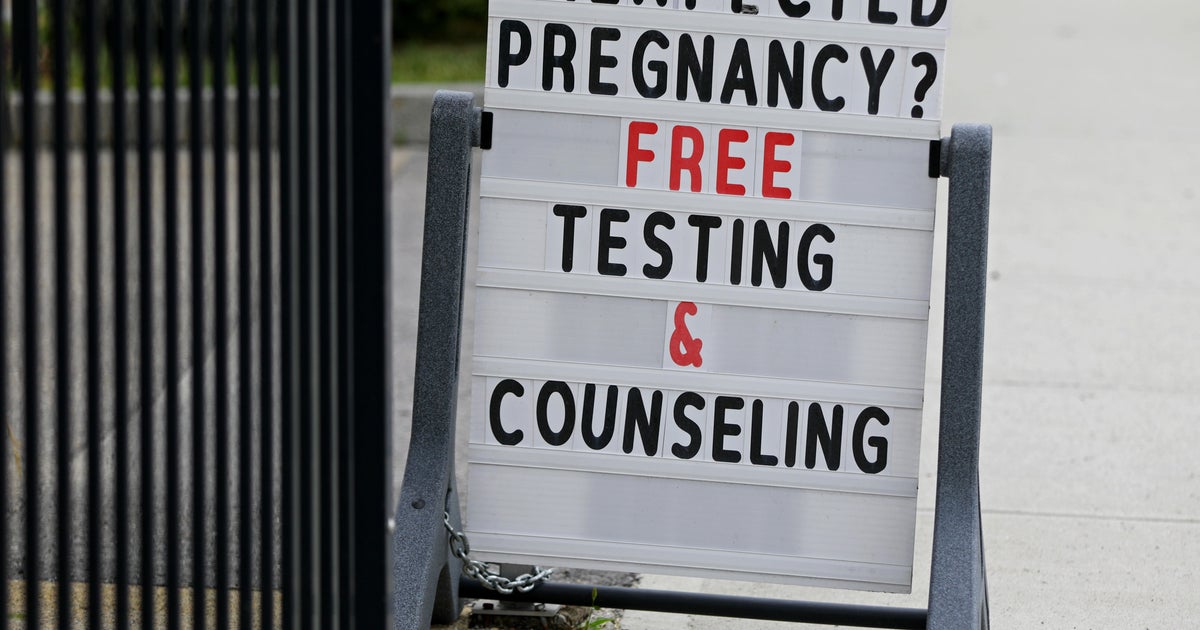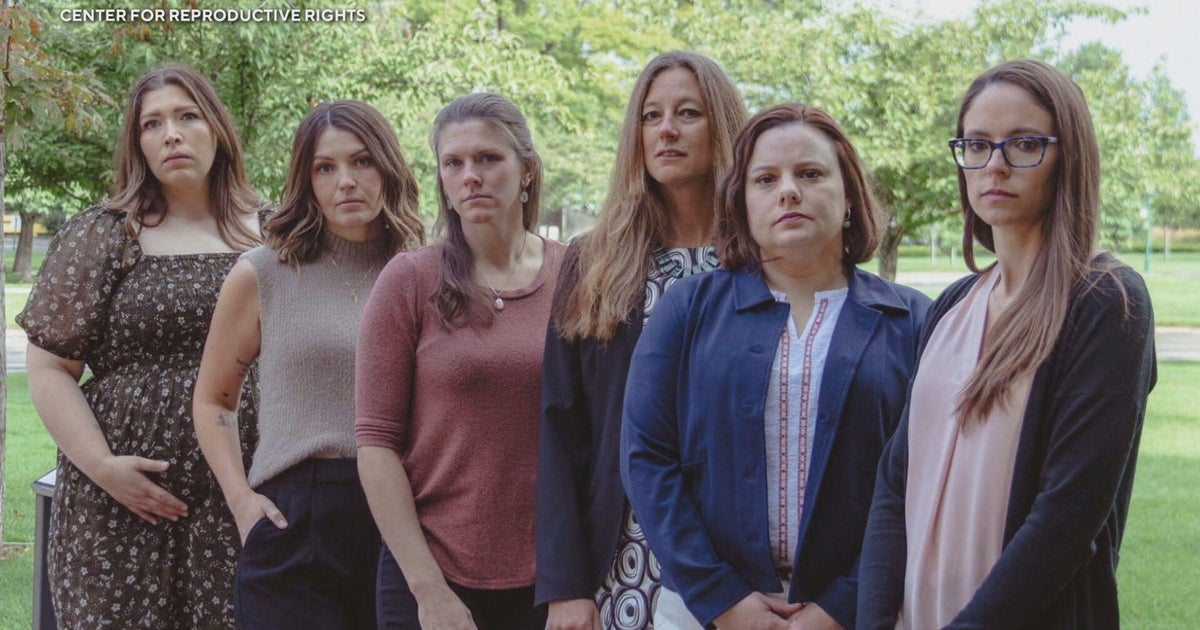CBS News
Anti-abortion rights groups say they can reverse the abortion pill. That’s fraud, some states say.

Some anti-abortion rights groups are selling a procedure called “abortion pill reversal,” which they claim can help women halt medical abortions. That claim is now being challenged by state officials who allege the groups are veering into false advertising and fraud.
Heartbeat International, an anti-abortion rights group, and 11 other anti-abortion organizations were sued Monday by New York Attorney General Letitia James, who alleged the organizations are making “false and misleading statements to advertise an unproven treatment.” The complaint follows a similar lawsuit filed by California Attorney General Rob Bonta in September.
Heartbeat has countersued, asking the courts to throw out California’s lawsuit on the grounds that it infringes its First Amendment rights. It also asserts that abortion pill reversal is safe and effective.
The litigation comes at a time when the so-called abortion pill — actually a combination of two drugs — accounts for almost two-thirds of abortions in the U.S., according to the Guttmacher Institute, which researches reproductive rights. More women are turning to medication abortion, rather than surgery, partly because it allows them to seek care privately and manage the process at home.
Meanwhile, abortion access has faced growing restrictions across much of the U.S. following the Supreme Court’s 2022 decision overturning Roe v. Wade. The high court is also currently considering a case that could ultimately curtail use of the abortion pill across the U.S.
In taking aim at the anti-abortion groups, New York and California are turning to state laws that prohibit deceptive business practices as well as false advertising — in effect, both are asking courts to rule on whether the clinics’ advertisements for abortion pill reversal treatment amount to fraud.
New York and California also want the courts to block Heartbeat and affiliated anti-abortion clinics from continuing to promote abortion pill reversal because they are allegedly misleading consumers.
For its part, Heartbeat International told CBS MoneyWatch that James’ lawsuit is a “clear attempt to censor speech.”
“By singling out these organizations solely because they offer an alternative to abortion, she is not only violating their rights but also denying women access to care and support as they seek to try and continue their pregnancies,” Heartbeat said in an email.
What is “abortion pill reversal”?
Medication abortion involves taking two pills: mifepristone, which was approved by the Food and Drug Administration in 2000, and misoprostol. To begin the process, a woman first takes mifepristone, which stops the pregnancy from growing. (The Supreme Court’s case involving the abortion pill is focused on mifepristone.)
About 24 to 48 hours after that, the woman takes misoprostol, which causes the uterus to contract and abort the fetus.
As this process has become the most common abortion treatment, anti-abortion clinics have turned to promoting a technique they claim can “reverse” the effect of the abortion pill. But that claim is misleading because it implies the treatment can undo an abortion, James alleges.
The anti-abortion clinics “imply the impossible — that fetal tissue that has been expelled from the uterus due to a completed abortion can be returned to the uterus. It cannot,” the New York lawsuit alleges.
In reality, the treatment is aimed at halting the medication abortion process midway by giving a woman a high dose of the hormone progesterone after she’s taken the first pill but before she’s ingested the second — at that point, an abortion hasn’t yet occurred.
Heartbeat International told CBS MoneyWatch the treatment has “saved” 5,000 babies of women who have sought to halt a medication abortion. It added that the cost of the treatment varies on the dose of progesterone used in the process. The group also vowed to “continue to offer support to those who seek it.”
Is abortion pill reversal safe?
Heartbeat’s website about abortion pill reversal claims the process is effective and says it “increases the chances” of a pregnancy continuing. The site also contends that the treatment can save 64% to 68% of pregnancies, although it only cites “initial studies” for the statistic, without identifying the specific research.
According to James’ suit, however, “no competent and reliable scientific evidence exists to substantiate these claimed success rates.” As a result, the complaint alleges such claims may mislead consumers about the treatment’s efficacy.
The lawsuit also claims that Heartbeat and other anti-abortion clinics describe the process as “proven safe and essentially risk-free,” while in fact the treatment hasn’t been tested in any reputable medical study.
In a response to CBS MoneyWatch, Heartbeat said the treatment “stands as a safe and effective option for women who change their minds immediately after taking the abortion pill, mifepristone.” The group noted that progesterone, the hormone used in the treatment, is an FDA-approved medication that has been used “for decades to prevent miscarriage and preterm birth.”
Heartbeat added that its assertions are supported by “both scientific evidence and the lived experience of women who are holding their babies in their arms today after starting a chemical abortion and experiencing a successful reversal.”
However, medical experts agree that abortion pill reversal hasn’t been proven safe, as the only double-blind, placebo-controlled, randomized clinical trial for the treatment had to be stopped after some women experienced “life-threatening complications like hemorrhage,” said Dr. Stacy Sun, an obstetrician and gynecologist and a fellow with Physicians for Reproductive Health, a group of doctors that advocates for reproductive health.
“This dangerous, non-evidence based regimen is used to prey on people making thoughtful decisions about their bodies, families and futures,” Dr. Sun told CBS MoneyWatch. “It is infantilizing and manipulative.”
In its countersuit, Heartbeat said that its claims the treatment has been effective in 64% to 68% of pregnancies are based on a 2018 study by Dr. George Delgado, a family physician who created the abortion pill reversal treatment. But James’ lawsuit notes that the study was based on tracking women who called the abortion pill reversal hotline and wasn’t a randomized, placebo-controlled trial.
Meanwhile, some states — primarily those that have restricted abortion access after Roe v. Wade was overturned — “actually require misinformation about medication abortion” to be provided to women who are seeking abortions, the Guttmacher Institute said in an email.
For instance, Nebraska requires that such patients be told: “If you change your mind and want to continue your pregnancy after taking mifepristone, it may not be too late.” They are then directed to Heartbeat’s abortion pill reversal hotline.
“Note that this is misinformation about medication abortion generally, and some of these states put it out in their materials” even if it isn’t required by statutes or regulations, the Guttmacher Institute said.
Heartbeat in February filed a suit seeking to throw out the California case, arguing that the organization is protected by the First Amendment in providing information about abortion pill reversal. The group’s complaint also argues that it is “not appropriate to litigate the merits of scientific studies in the judicial system.”
Heartbeat, which doesn’t itself operate any clinics but provides support to about 3,000 anti-abortion rights centers, said it “receives no kickback or other payment for referring a woman to a physician” in the network of clinics offering abortion pill reversal, according to its suit.
“With this lawsuit, [Attorney General] James is protecting Big Abortion in New York while denying women in her state the right to continue their own pregnancies,” said Jor-El Godsey, president of Heartbeat International, said in the statement sent to CBS MoneyWatch.
CBS News
“Sandwiches of History”: Resurrecting sandwich recipes that time forgot

Barry Enderwick is eating his way through history, one sandwich at a time. Every day from his home in San Jose, California, Enderwick posts a cooking video from a recipe that time forgot. From the 1905 British book “Salads, Sandwiches and Savouries,” Enderwick prepared the New York Sandwich.
The recipe called for 24 oysters, minced and mixed with mayonnaise, seasoned with lemon juice and pepper, and spread over buttered day-old French bread.
Rescuing recipes from the dustbin of history doesn’t always lead to culinary success. Sampling his New York Sandwich, Enderwick decried it as “a textural wasteland. No, thank you.” Into the trash bin it went!
But Enderwick’s efforts have yielded his own cookbook, a collection of some of the strangest – and sometimes unexpectedly delicious – historical recipes you’ve never heard of.
Harvard Common Press
He even has a traveling stage show: “Sandwiches of History Live.”
From the condiments to the sliced bread, this former Netflix executive has become something of a sandwich celebrity. “You can put just about anything in-between two slices of bread,” he said. “And it’s portable! In general, a sandwich is pretty easy fare. And so, they just have universal appeal.”
Though the sandwich gets its name famously from the Fourth Earl of Sandwich, the earliest sandwich Enderwick has eaten dates from 200 B.C.E. China, a seared beef sandwich called Rou Jia Mo.
He declared it delicious. “Between the onions, and all those spices and the soy sauce … oh my God! Oh man, this is so good!”
While Elvis was famous for his peanut butter and banana concoction, Enderwick says there’s another celebrity who should be more famous for his sandwich: Gene Kelly, who he says had “the greatest man sandwich in the world, which was basically mashed potatoes on bread. And it was delicious.”
Whether it’s a peanut and sardine sandwich (from “Blondie’s Cook Book” from 1947), or the parmesian radish sandwich (from 1909’s “The Up-To-Date Sandwich Book”), Enderwick tries to get a taste of who we were – good or gross – one recipe at a time.
RECIPE: A sophisticated club sandwich
Blogger Barry Enderwick, of Sandwiches of History, offers “Sunday Morning” viewers a 1958 recipe for a club sandwich that, he says, shouldn’t work, but actually does, really well!
MORE: “Sunday Morning” 2024 “Food Issue” recipe index
Delicious menu suggestions from top chefs, cookbook authors, food writers, restaurateurs, and the editors of Food & Wine magazine.
For more info:
Story produced by Anthony Laudato. Editor: Chad Cardin.
CBS News
The cream of the crop in butter

Watch CBS News
Be the first to know
Get browser notifications for breaking news, live events, and exclusive reporting.
CBS News
Baking an ancient bread in Tennessee

Watch CBS News
Be the first to know
Get browser notifications for breaking news, live events, and exclusive reporting.








